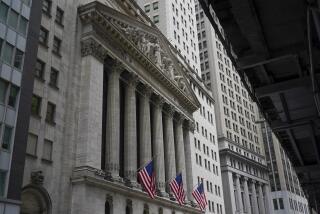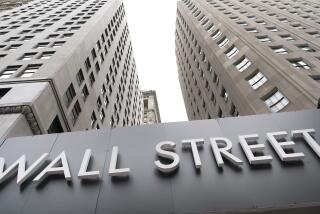IPO Volume Surges in First Quarter
- Share via
U.S. companies sold more stock in initial public offerings in the first three months of this year than in any first quarter since 2000, as economic growth fueled stock sales and reduced demand for convertible bonds and agency debt.
The value of IPOs sold in the first three months of 2005 rose 47% to $10.1 billion from a year earlier, the highest amount since a record $18 billion was sold in the first quarter of 2000, data compiled by Bloomberg showed. Convertible bond issuance dropped 61% to $6.6 billion, a fifth of 2002’s level. U.S. agency debt sales fell 40% to $177 billion from last year’s peak.
U.S. economic growth last year was the highest since 1999, the Commerce Department reported Wednesday. The expansion lifted corporate profits an average of 13.5% in the fourth quarter, encouraging closely held companies to raise money through stock sales and allowing established companies to scale back their needs for financing from the debt markets.
“Business optimism is returning without a huge need to raise cash,” said David Kelly, an economic advisor to Putnam Investments in Boston, which oversees more than $200 billion for clients.
The first-quarter increase in IPOs heralds a bonanza for Wall Street underwriters, led by New York-based Morgan Stanley, the world’s No. 2 securities firm by capital. IPO fees averaged 5.7% of the value of each transaction, compared with 3.6% for so-called secondary share sales and 2.9% for convertible bonds, Bloomberg data show.
The average value of IPOs in the first quarter was $259 million, 51% higher than a year earlier. The biggest deal was the $1.6-billion sale in February by Huntsman Corp. of Salt Lake City, the third U.S. chemical producer in six months to go public. Citigroup Inc., Credit Suisse First Boston, Deutsche Bank and Merrill Lynch & Co. shared $69.8 million in fees for underwriting the offering.
The No. 2 IPO was the $900-million sale of Wilton, Conn.-based PanAmSat Holding Corp. on March 17, managed by Morgan Stanley, Citigroup and Merrill Lynch. All three underwriters are based in New York.
“We have a strong economy,” Charles Schwab, founder and chief executive of the brokerage named after him, said at an investor forum Tuesday in New York. “I’m pretty confident that we’re going to have a good, solid background for investing.”
Analysts expect the economy to grow 4% in the first quarter and 3.8% for the year, based on the median forecasts in the latest Bloomberg monthly survey.
Mergers and acquisitions announced in the U.S. increased 4% to $300 billion in the first quarter, Bloomberg data show. Procter & Gamble Co.’s $57-billion agreement to buy Gillette Co., maker of the world’s best-selling men’s razors, made cosmetics the No. 1 merger and acquisition industry. Goldman Sachs Group Inc. advised Boston-based Gillette on the transaction with UBS. Merrill Lynch, the world’s largest securities firm, advised Cincinnati-based Procter & Gamble.
Telecommunications was the No. 2 industry for mergers in the quarter, down 15% from a year earlier, while purchases of retailers were No. 3, Bloomberg data show.
More to Read
Inside the business of entertainment
The Wide Shot brings you news, analysis and insights on everything from streaming wars to production — and what it all means for the future.
You may occasionally receive promotional content from the Los Angeles Times.










